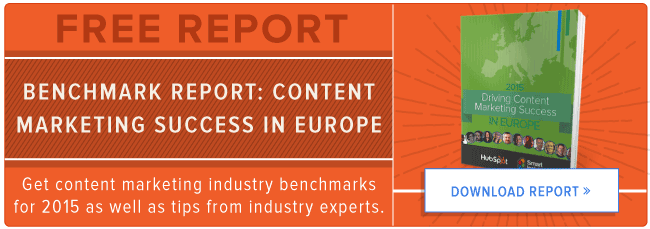
Content marketing is nothing new to marketers all over the world. Many of us know it's the fuel that drives many of the key inbound marketing techniques across web, search, social, and email marketing. But because content has become a well-established part of global companies' overall marketing strategies, the online content space is becoming more and more competitive.
To get ahead and stand out, the key is knowing where in your content strategy to invest. The question is, how? And how can you tell whether you're behind the curve or on the cutting edge of the content game?
To help answer these questions, HubSpot collaborated with Smart Insights to summarise data from over 700 marketers across Europe and set a benchmark on how competitive content marketing has become. This data can help show you where to focus your content marketing activities in order to stay competitive, and it includes key insights on the data from leading industry experts.
Click here to download our free industry benchmark report for driving content marketing success in Europe.
Want a taste of what's in the report? Here are a few of our key findings.
1) Content marketing is hyper-competitive.
We found that businesses are increasing investment in content marketing. Check out how businesses rated the value of content marketing:

Key Stats:
- 71% of businesses are creating more content in 2015 compared to 2014
- Only 3% of survey respondents don’t see the opportunity from content marketing. In other words, marketers believe in the power of content marketing.
- Over a quarter of companies are increasing internal headcount for content marketing, and 28% are increasing investment in agency resources this year.
2) Managing content marketing remains challenging.
We found that the key issues in managing content marketing are the creation of quality content and measuring ROI. Look at to what extent the organisations we surveyed have embraced content marketing:

Key Stats:
- When rating their content marketing capabilities, the majority of businesses see significant room for improvement with over two-thirds (67%) rating their content marketing as basic, inconsistent or limited.
- Managing content creation is a headache for many, with 55% citing content quality and 58% citing content frequency as specific concerns.
- Measurement of ROI and content effectiveness is a challenge for over half (51%) of businesses.
3) Strategy and planning are big parts of companies' content marketing success.
The following content marketing tactics were the highest rated by marketers for effectiveness:

4) SEO is the most popular technique for organic content distribution.
We found that marketers are using SEO tactics more than social media for organic content distribution. Notice that Google organic traffic (SEO) had much more positive ratings than Facebook, LinkedIn, Twitter, and Google+ as an organic content distribution option.

5) Paid distribution on social is still not being utilised much.
As you might expect, a lot of marketers aren't investing in paid content distribution.

Key Stats:
- 50% of respondents don't use using Twitter ads.
- 48% of respondents don't use LinkedIn ads.
- 46% of respondents don't use Facebook ads.
- 49% of respondents don't use Google Remarketing.
- Out of the respondents using paid content distribution, Google AdWords is the most used platform, with 53% having paid for their ads to show up in search results.
6) ROI remains difficult to analyse
Marketers are still struggling to measure ROI from content marketing.

Key Stats:
- Only 39% claimed they were able to measure return on investment from their content marketing.
Want more insights on current content marketing trends in Europe? How about predictions from industry experts on what the data means? Download our brand new report with Smart Insights, Driving Content Marketing Success in Europe, 2015.







![What Businesses Get Wrong About Content Marketing in 2024 [Expert Tips]](https://www.hubspot.com/hubfs/half-hearted%20content%20marketing.png)

![The State of Content Marketing in 2023 [Stats & Trends to Watch]](https://www.hubspot.com/hubfs/the%20state%20of%20content%20marketing%202023.jpg)


